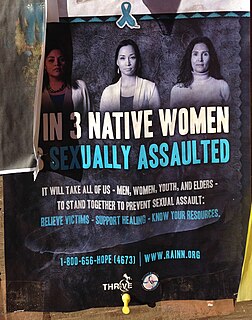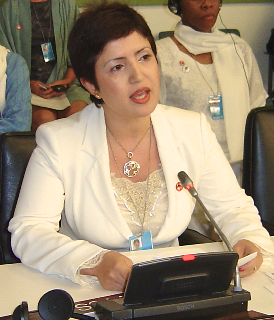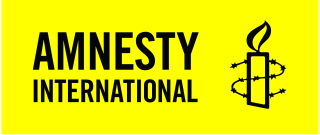Stop Violence Against Women is a worldwide campaign of Amnesty International to counter violence against women.
It was started on 5 March 2004, in preparation before International Women's Day. It is one of Amnesty's key campaigns. Amnesty considers that domestic and sexual violence are serious breaches of human rights and Amnesty should confront them. The campaign focuses on ending impunity for those who commit such violence, by pressuring governments to prosecute individuals and change laws to protect women. Amnesty is particularly concerned at the incidence of rape and other violence committed in conflicts such the Second Congo War and Darfur conflict

The National Day of Remembrance and Action on Violence Against Women, also known informally as White Ribbon Day, is a day commemorated in Canada each December 6, the anniversary of the 1989 École Polytechnique massacre, in which armed student Marc Lépine murdered fourteen women and injured ten others in the name of "fighting feminism". The commemoration date was established by the Parliament of Canada in 1991. The legislation was introduced in the House of Commons as a private member's bill by Dawn Black, Member of Parliament for New Westminster-Burnaby, British Columbia, and received all-party support.

Gender equality, also known as sexual equality or equality of the sexes, is the state of equal ease of access to resources and opportunities regardless of gender, including economic participation and decision-making; and the state of valuing different behaviors, aspirations and needs equally, regardless of gender.

Human rights in Uganda relates to the difficulties in the achievement of international rights standards for all citizens. These difficulties centre upon the provision of proper sanitation facilities, internal displacement, development of adequate infrastructure, as well as the mistreatment of the LGBT community, women, and children. Nonetheless, Uganda is, as per the Relief Web sponsored Humanitarian Profile – 2012, making considerable developments in this area.

According to a U.S. Department of Justice study, Native American women are more than 2.5 times more likely to experience sexual violence than any other ethnicity. The same study shows that Native American women are victimized the most by all races out of all populations in the United States.
The United Nations General Assembly has designated November 25 as the International Day for the Elimination of Violence Against Women. The premise of the day is to raise awareness of the fact that women around the world are subject to rape, domestic violence and other forms of violence; furthermore, one of the aims of the day is to highlight that the scale and true nature of the issue is often hidden. For 2014, the official Theme framed by the UN Secretary-General’s campaign UNiTE to End Violence against Women, is Orange your Neighbourhood. For 2018, the official theme is "Orange the World:#HearMeToo", for 2019 it is "Orange the World: Generation Equality Stands Against Rape" and for 2020 it is "Orange the World: Fund, Respond, Prevent, Collect!".
Dowry deaths are deaths of married women who are murdered or driven to suicide by continuous harassment and torture by their husbands and in-laws over a dispute about their dowry, making the women's homes the most dangerous place for them to be. Dowry deaths are found predominantly in India, Pakistan, Bangladesh, and Iran.

Violence against women (VAW), also known as gender-based violence and sexual and gender-based violence (SGBV), are violent acts primarily or exclusively committed against women or girls. Such violence is often considered a form of hate crime, committed against women or girls specifically because they are female, and can take many forms.
Amnesty International New Zealand is a part of the Amnesty International network, an international nonprofit organisation working to end human rights abuses. It is one of over 70 nationally organised sections or national offices of the global Amnesty movement.
Amnesty International USA (AIUSA) is one of many country sections that make up Amnesty International worldwide.
Domestic violence is a severe issue in Russia. According to Human Rights Watch, as many as 36,000 women and 26,000 children faced daily abuse at home in 2013. According to official MVD data, in 2015 around 1060 people died of domestic violence in Russia. Of them, 756 were men and 304 women. According to an independent study of 2 200 women in fifty cities and towns in Russia, 70% have experienced at least one form of gender-based violence in the home—physical, psychological, economic, or sexual.
Amnesty International South Africa is a South African organisation that works to end human rights abuses along with its affiliate organization Amnesty International.
Day for Darfur is an international advocacy campaign that works to bring together activists in cities around the globe in calling for action on the crisis in Darfur, western Sudan.

Widad Akreyi is a Kurdish health expert and human rights activist, She has co-founded the human rights organization Defend International and is the author of several books about both health issues and human rights.

The Center for Women's Global Leadership, based at Rutgers University, was founded in 1989 by Charlotte Bunch, the former executive director and an internationally renowned activist for women's human rights. Executive Director Krishanti Dharmaraj is also the founder of the Dignity Index and co-founder of WILD for Human Rights and the Sri Lanka Children's Fund. The former executive director, Radhika Balakrishnan, is now the faculty director, and a professor in the Department of Women's and Gender Studies at Rutgers, chair of the Board of the US Human Rights Network, and a board member of the Center for Constitutional Rights. Located on Douglass Residential College at Rutgers University, CWGL is a unit of International Programs within the School of Arts and Sciences and is a member of the Institute for Women's Leadership, a consortium of women's programs at Rutgers.

Amnesty International is an international non-governmental organization with its headquarters in the United Kingdom focused on human rights. The organization says it has more than seven million members and supporters around the world.
The Declaration on the Elimination of Violence Against Women was adopted without a vote by the United Nations General Assembly in the 48/104 resolution of 20 December 1993. Contained within it is the recognition of "the urgent need for the universal application to women of the rights and principles with regard to equality, security, liberty, integrity and dignity of all human beings". It recalls and embodies the same rights and principles as those enshrined in such instruments as the Universal Declaration of Human Rights, and Articles 1 and 2 provide the most widely used definition of violence against women.

Human rights in Liberia became a focus of international attention when the country's president, Ellen Johnson Sirleaf, was named one of the three female co-winners of the 2011 Nobel Peace Prize, all of whom were cited "for their non-violent struggle for the safety of women and for women's rights to full participation in peace-building work".

Human rights in South Sudan are a contentious issue, owing at least in part to the country's violent history.
Violence against women in Mexico includes different forms of "gender-based violence" and may consist of emotional, physical, sexual, and/or mental abuse. The United Nations (UN) has rated Mexico as one of the most violent countries for women in the world. According to the National Institute of Statistics and Geography in Mexico (INEGI), 66.1 percent of all women age 15 and older have experienced some kind of violence in their lives. Forty-nine percent have suffered from emotional violence; 29 percent have suffered from emotional-patrimonial violence or discrimination; 34 percent from physical violence; and 41.3 percent of women have suffered from sexual violence. Of the women who were assaulted in some form, 78.6 percent of them have not sought help or reported their attacks to authorities.

Julienne Lusenge is a Congolese human rights activist recognized for advocating for survivors of wartime sexual violence. She is co-founder and President of Female Solidarity for Integrated Peace and Development (SOFEPADI) and director of the Congolese Women's Fund (FFC). She is the recipient of the 2018 Women’s International Rights Award from the Geneva Summit for Human Rights and Democracy and the 2016 Ginetta Sagan Award from Amnesty International. She received the Human Rights Award from the Embassy of France and named a Knight of the Legion of Honour by the French Government. She was awarded an International Women of Courage Award in 2021.